Text
Short Thoughts: Scarlet Nexus
Electric combat, sci-fi nihilism, gorgeous art - more than enough for me to consider Scarlet Nexus a gem of the locked-path, mashing JRPG genre.
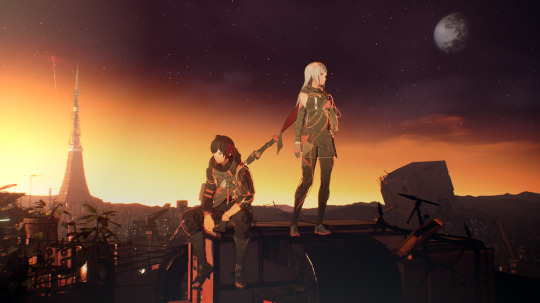
I can't name another game where the fighting is this repetitive and this fun. I fought the same enemies again and again in mildly different patterns and numbers, but the SAS system, different chains and attack patterns, and slamming G for armor shatter cutscenes were all so, so satisfying. It's this kind of combat that made it easy to come back even after a lot of time away, and made the characters even more endearing because of how you had to rely on them individually or in combination during fights.
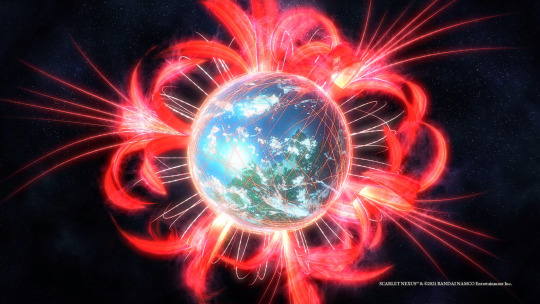
The story was almost beautiful. They told such a hopeless story with wonderful art, animated comic cutscenes, and great voice acting. I have several complaints about how a few of the grandiose plots were tied off and some overly convenient resolutions to genuine sadness, but will save them for a time where I feel like playing through Kasane's path from the start.
Even I've only followed Yuito, I wanted to like how Kasane and their relationship was written so much more, but the gap between the amount of opening up she did vs. how baller of a concept she represented was a bit too much for me. I felt like the side characters had more character development through their bond episodes than Yuito and Kasane. Though I still loved those moments where it was just the two of them running through the wilderness. Something beautiful in such sad emptiness. I wish those lasted longer.

Games like these remind me of things I want, of dreams I want to realize. I'm on my way, still holding my dreams. It's getting harder, I'm growing up, but I still haven't given up on the most ridiculous things, even after the hardest year of my life. The last three years have been pretty terrible, but something Scarlet Nexus really pushes is the idea that you can be loved and protected by people who you can no longer be with. And I'm starting to feel that come through.
Oh and the music was somehow both new and JRPG-classic. I'll recommend "Farewells." This soundtrack was different to me in that they fit the game really, really well, but don't feel as great listened to in isolation.
It's been a long time - I'm happy to be happy enough to play a game or watch a show to completion, and then full of healthy emotion enough to want to share my thoughts.
I hope you're doing well.
- For Ice Cream
10 notes
·
View notes
Text
Anime Music Highlight: 初恋の呪い - Yasuda Akiyoshi
A fantastic example of a piece of music elevating the show. I'm not a fan of most things in Osamake - but when this track reaches its main theme, I had to replay it several times. Leaving it here to share, and so I know where to find it.
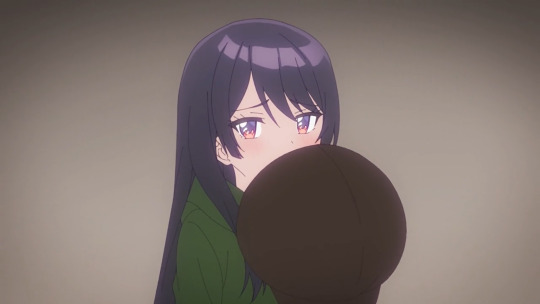
0 notes
Text
Short Thoughts: Alice in Borderland
When I read the little Netflix blurb, I knew the setting, I knew the tropes. And now at the end, there is still so much not to like. But I soared through the first season when it came out, and I finished this one as quickly as I started it. I think Alice in Borderland made just enough meaningful emotional contact to elevate themselves from the 'death game' genre.
[Some light spoilers]

More than anything, I think this show is a rarity in the genre because of how they portrayed rejection in most of the cast, how each of them was rejected by the world, and what they could or couldn't do in response. Some characters told you right away; others painted that picture over time. Combined with the show's built-in concept of escapism, there was a lot to relate to for a lot of people.
To me, 'death game' anime shows and games lean heavily on the glorification of every kind of violence and centering of stereotypes, with the concept of "this is not how it should be" or "this is not the real world" as poor arguments in defense. This show was weak in some of these areas.
I still have to think more about how they handled interactions involving sexual assault, which came up more than a handful of times across the two seasons. And they like their anime tropes: I think Murakami Nijirō as Chishiya handles them beautifully despite being responsible for most of the scoffs, smirks, and one-liners, but there are plenty of unnecessary moments, like a villain taking time to verbally ship the main characters. By the end, Niragi was ultimately unconvincing. Then, I'm curious how Heiya was written in the original material, because her character felt really crammed despite her being centered as the show went on. I didn't understand her having feelings for Aguni (and I could always do with less high schooler and older person vibes). The last criticism off the top of my head - there was just a little too much of Arisu having to do something to save someone or bail people out - Usagi feels too dependent through the second season compared to the first. The side characters were such ballers in this show and it was so close to being balanced.
And now the compliments.
Something I know I love is an acceleration of high density action and emotion at the end of a show. Usually the ball will be dropped somewhere as the pacing speeds up, but the last two episodes of the second season were really stunning.
The fight scene in episode 7 is one of my favorite fight scenes of all time. The untalented main character was not present. It honored what the characters were good at, but as time went on, fatigue funneled all their skill and passion into trading fists, running on fumes, balancing hopeful desperation and hopelessness unbelievably well. I absolutely did not expect this level of ferocity. My heart dropped several times. And then the idea that all the games in the show are hosted in designed spaces with rules and moderation, but that the apex fight of both seasons is close-range, in an alley, people just throwing themselves at each other - it just adds to the feeling of futile glory.
I really liked the flashback to Heiya and her friends walking out of school. I think they did Heiya's bow moments well. She didn't feel ineffectual or overpowered. I liked Chishiya's flashback at the Supreme Court. And I did like the last episode, and though I don't entirely agree with the concept they chose, this quote is still something:
Arisu: “So…what is this place anyway?”
Mira: “…You’ll soon find out. Of your two choices, no matter which you choose, you’ll know the answer. You’ll know what kind of person you are. You’ll know. Life is like a game. Enjoy it more.”

The Alice in Borderland OST I'm listening to right now: Your Smile.
It's been a ridiculous couple of months. I'm having a hard time fitting in, but the last two months have been better. I've watched a lot of stuff, but this is the first time in a while that I feel like I have enough time to let things stir in my head to write about it.
I hope you're doing well.
- For Ice Cream
6 notes
·
View notes
Text
Shana's Melon Bread
I started watching anime 12 years ago, after getting hooked by Shakugan no Shana. Today, I saw melon bread at a japanese grocery store in san diego and felt it all come full circle. If I rewatched SnS today, I would probably find it unwatchable, but this show gave me so much when I was at one of my lowest points.
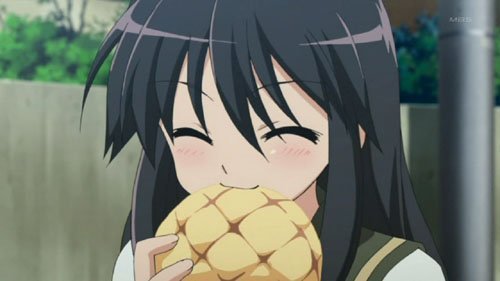
Most of the time, anime moves me in obvious ways, but little things like this that don't do much until they click are really beautiful.
On another note, I start two weeks of orientation on Monday for the biggest commitment of my life. I'm scared of failing social interactions, but I'm fully believing in the idea that the hardship I'm about to face is nothing compared to the happiness I've experienced.
Best of luck to you as well. It's been tough. I wish you the best.
Oh and I bought the bread and it was delicious. Wasn't crunchy like Shana's tho.
And shout-out to the SnS season 1 Op
-For Ice Cream
8 notes
·
View notes
Text
Invincible Rainbow Arrow, Indeed - AI: The Somnium Files
"Even with the devils of time against you, never let the fire fade in you!" A game with plenty of ups, plenty of downs, and the most stellar, prepared, yet surprising ending sequence I've seen in a game yet.
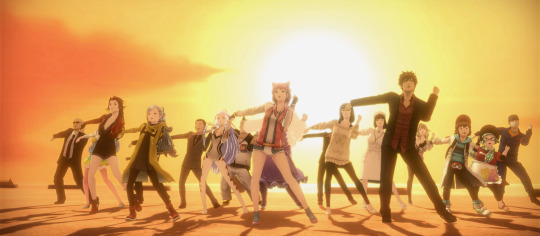
When this game did something well, it did that thing really well: Ota's route, the loose logic in the somnia, and unfolding characters' intentions and actions while having each peel in each route make just enough sense. When this game did something poorly, it was right there: ecchi comedy (ex: distracting hired guns with underwear), flat graphics/colors, and the relationship between Date and Iris.
I played the game in Japanese and when Invincible Rainbow Arrow first played, it got stuck in my head. Then I got to the final sequence and was blown away. I am always swayed by creative choices that feel like unabashed love letters, and this moment felt like that.
Quick thoughts: Besides IRA, most of the music was surprisingly just okay for me. Usually I'm wowed by a couple of the soundtracks. I really enjoyed the gameplay in the dreams. Mizuki being a superhuman is a bit of an action/plot crutch, especially because of how little time you spend with Mizuki.
I hope summer is treating you well. I'm about to start school in a faraway place and I'm honestly a little scared of it all. But I've been doing better at relaxing and addressing my fears.
[Adding Invincible Rainbow Arrow to the list of songs that give me courage]
- For Ice Cream
3 notes
·
View notes
Text
Short Thoughts: Aokana (Asuka)
Anime really doesn't need animation to be amazing. Aokana was my first visual novel and I'm glad I got to experience it! Even without running all the routes, I wanted to get my thoughts out before I forgot! [general spoilers ahead]
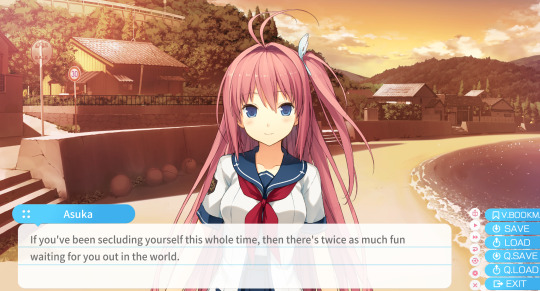
I've been going through a lot, especially losses of passion, dwindling friendships, difficulties finding joy in every day things, and feeling loss when I look back and look forward. But the last few months, things have been getting better, with luck and effort, and for a lot of reasons that Aokana touches on. In that regard, I felt that Masaya (and Aoi) took care of me as a viewer.
I was pulled in right away. The nostalgic, late-2000s/Pokemon-reminiscent soundtracks worked so well with the gorgeous backgrounds and character designs. I found their use of jumping still figures, changes of expression, and switches to chibi artstyles to be earnestly charming and well-picked, instead of cringeworthy. If I have nothing to complain about even after seeing the same 20-40 backgrounds and blushing faces--haha.
Most importantly - the dialogue. Aokana forged a fantastic balance between characters thinking as we would in a moment, then also how we sometimes have moments of clarity and self-reflection while the moment is happening. The honesty and character development they were able to pull out of both of those choices made so many standard, repetitive conversations and flashbacks incredibly touching. Honestly, I identified a lot with Aoi and Masaya's traumas, and I didn't feel like I was being weighed down by watching them go through it, while still feeling uplifted as they bloomed again. There are also some fantastic one-liners that really hit me.
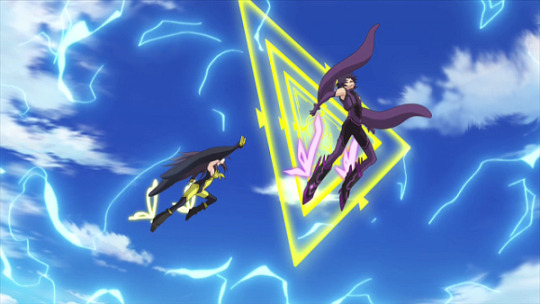
And finally, for the first time, I marveled at a sport and competition conceptualized purely for anime/tv. I thought flying circus (FC) and the way it was presented was utterly convincing. I felt so many parallels between existing sports and esports, in the way FC is played and in the way the characters talk about its strategies and meta. The presence of basic physics and lack of basic physics was the perfect line.
As far as criticisms go: I am not a fan of the erotic elements here. Only a handful felt natural, while the rest slightly disrupted the atmosphere, story, and the characters' dispositions. Then, Asuka's route in general felt overly convenient for Asuka and Masaya. Specifically, the ending for Asuka's route came off as anticlimactic and rushed, with Irina and Inui's final actions and strategy choices clashing with their worldviews and goals, and also how wonderfully those two were pedestaled as antagonists, not just to other schools, but to the world of FC. The last tournament felt slipshod compared to the very first tournament and kind of made a mess of all the good character building they had done up to that point. I was also pretty unsatisfied with the way Asuka and Masaya "innovated" and how Asuka and Inui suddenly change everything to get past the final fight.
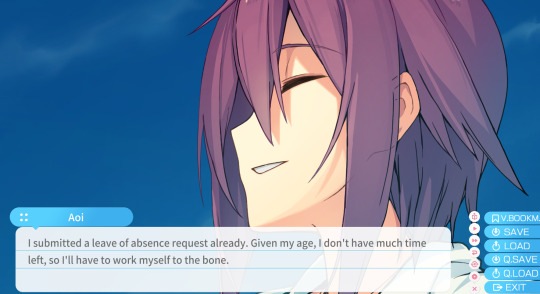
I had those complaints. It was still really effin good.
I loved the soundtrack. It's such a nostalgic callback for me to hear action, romance, and slice-of-life scored this way. Maybe I'll just recommend the whole thing and say that I'm listening to Kara no Naka no Kotori on repeat while I'm writing this.
I'm a little more ready to not give up on the things that are important to me. I really hope that you're doing well. I hope you have a place to let bad things out after you've had to sit with them.
Until next time!
- For Ice Cream
1 note
·
View note
Text
Anime Music Highlight: D-Frag - Warmth
youtube
I thought D-Frag! was the funniest show when I was in high school. I'm going to try rewatching it soon and I'm pretty sure I won't like it for a lot of different reasons. But something that most anime shows possess, even the bad ones, is a piece of fantastic music.
0 notes
Text
Happy birthday Onodera Kosaki
'I really hate it when I miss you and I can't do anything about it.'
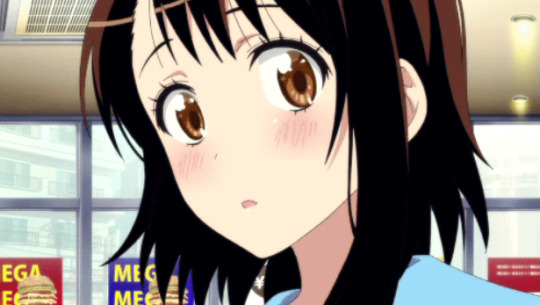
2 notes
·
View notes
Text
Short Thoughts: Digimon Story - Cyber Sleuth
After playing Hacker's Memory to completion, I thought I wouldn't get caught up in the same game with a different story.
How foolish.
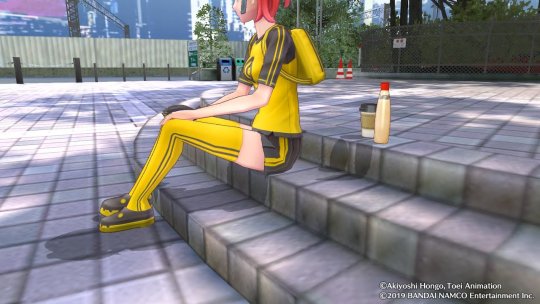
The game's ability to evoke strong emotion as frequently as they do, 10/10. The nonsensical quirkiness, 10/10. The strangely progressive writing, at times, and hilarious side quest plot points (poop comparison quest, anyone?) 10/10. But I also really liked the core explanation for the world disruption that happens in both games, and how the cast of characters truly fit together. That on top of all of the characters going through intense trauma, regret, self-loathing, fighting demons alone, fighting digimon together with digimon, getting worse, getting better, and finding solace and hope in company.
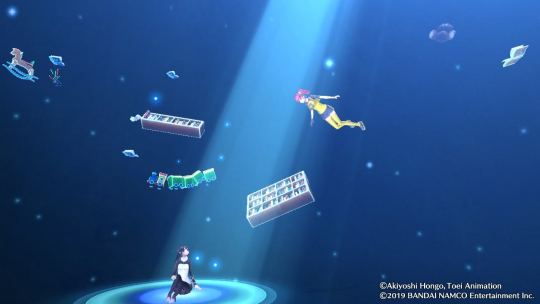
Did I like Hacker's Memory more? Yes. Did I think Hacker's Memory had a more touching, more cleanly executed story? Yes. But was this still an effing brilliant, underrated, stunningly written game? Absolutely. And actually, both games made each other more beautiful, because in each game, you engage with a different side of every single person you meet, be it a main character or the most passing of passing ones, which is a memorable representation of what it's like to "know" someone.
Some small nice things: there was an extended side quest where you get to hang out and talk with Terriermon. Come on. That alone is worth buying a two game bundle (and on sale??). I also especially liked the condition of the main character, and how it changed over the course of the story. Then I really did love the main cast. Their plot arcs had me feeling and their banter actually felt like watching friendship.
Small shout-out to the final boss music, The Anticipated New World, which was a remix of the fourth movement of Dvorak's New World Symphony. Usually the remixes of classical music are pretty shallow, but I liked this one!
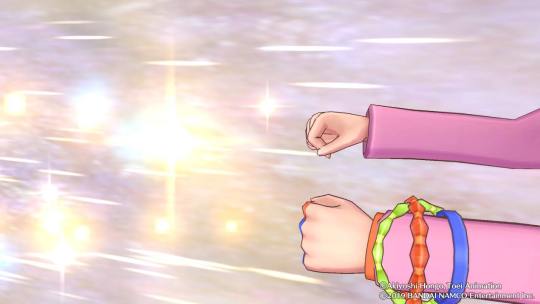
Lastly, the final cutscene was beautiful. I felt like they were really talking to someone who had broken. As I continue to get healthier and also perform better at my auditions, it was really...peaceful to look back at a character going through something similar, because of who they are, decisions they made, things they can't control, and to see them moving towards an unexpected, not fully complete, but seemingly happy ending.
And to think, this game really just looked like a childhood nostalgia trip.
Winter is passing, but a lot of things are unbelievably bleak. I hope March treats you well and that you get to try some things that you want to try. Take care.
- For Ice Cream
24 notes
·
View notes
Text
Short Thoughts: Digimon Story: Cyber Sleuth – Hacker's Memory
Sure, I bought the game only when it went on sale at 75% of the original price. Sure, I only felt drawn to the game because of some lingering nostalgia for the first two groups of DigiDestined. But, well, Hacker's Memory is more than special enough for me to share something about it. Very slight teasers/spoilers ahead.
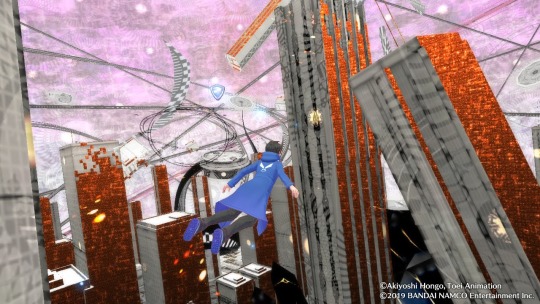
Most anime franchise games end up being absolute garbage (like SAO, Naruto). They are cash grabs in very little disguise; they have bland universes, dull art, poor writing, and terrible combat. From the very start, Hacker's Memory strikes you with beautiful cutscenes, an impressive virtual reality concept that connects well with the Digimon anime universe, and an intriguing plot. Even though the majority of the game is spent in overly routine dungeons/URLs, there was clearly some love put into this game.
Inside of an inflexible RPG questing structure were a few of the most evocative, strange side quests I have ever experienced. One day, I helped a Digimon settle their love triangle, and then from the same quest board, I watched a bullied student break, then murder their bullying classmates by means of virtual reality. Both the mandatory and optional side quests are either all fluff or are unbelievably thick. Some things felt fully PG and then a sudden few things very much not. Even one of the main arcs is centered on a deep-seated, dependent obsession and a twisted love. All I'll say about the main plot is that I think they did really well with what I thought was going to be a stereotypical line.
The facial animations added a lot to a standardly silent main character. There are a decent number of dialogue options, even though none of them have any effect on the story. If someone or something in the game was really special, the writers and visual artists really went out of their way to show you how special. I'll leave this gorgeous, almost-indie still photo as an example (it moves in the game, and the main character moves through the space).
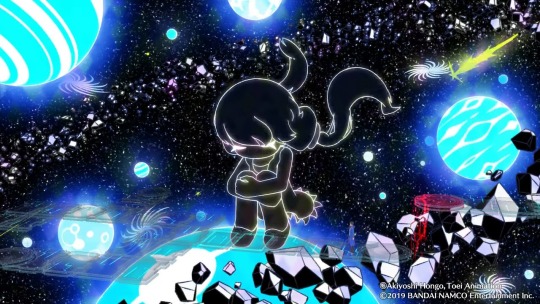
And then they used it very rarely, but some cutscenes received some extremely beautiful, fluid, better-than-TV animation. There's some great variation in animation between these beautiful cutscenes, the more 3-D game-based cutscenes, the more 2-D game-based cutscenes, and then the animations of the gameplay itself.
And of course! Getting to digivolve all the digimon was so much fun, somehow worth grinding for exp-boosting equipment. Then, if the gameplay for an rpg is in any way repetitive, rest assured, the music almost always runs in that vein. Still, there was some good quirk and humor in the soundtrack composition that made grinding and exploration a lot less bothersome than it should have been. My favorite fun track was, "I Can Clown Around Anytime, But I'll Dance." Then for the touching stuff, I'd recommend listening to "Memories" and "Cutting Away Memories," the last of which hits different after finishing the game. Gosh.
I'll leave a short photo stack at the bottom of this post to add to the intrigue. If you were a Digimon fan back in the day, even for a little while, this is not a bad game to pick up. I got the version that includes both games, so I'll probably end up playing Cyber Sleuth at some point. Probably after my audition next week.
I hope it's not too cold wherever you are and that you find some time to do something enjoyable and healthy.
- For Ice Cream
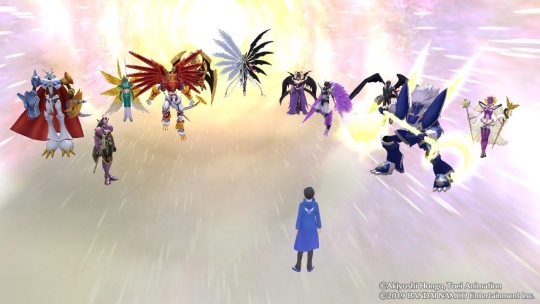
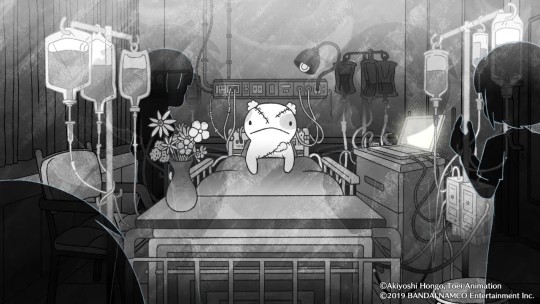
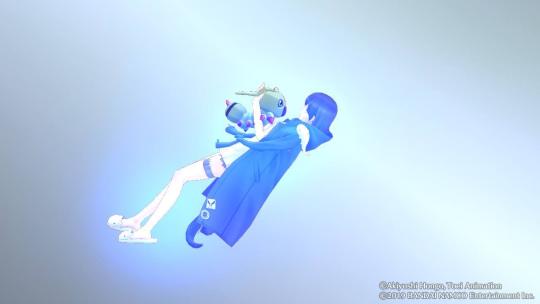
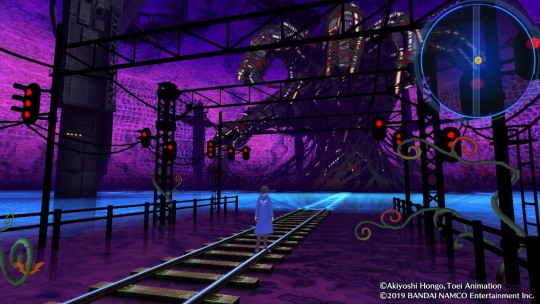
#digimon#cyber sleuth#hacker's memory#anime game#rpg#anime rpg#game review#toei animation#digimon cyber sleuth
29 notes
·
View notes
Text
Short 2am Thoughts: Cowboy Bebop
A friend of mine has been wanting to talk about the live action for Cowboy Bebop for a while, but I wanted to rewatch the anime before doing so. It's still unbelievably touching.
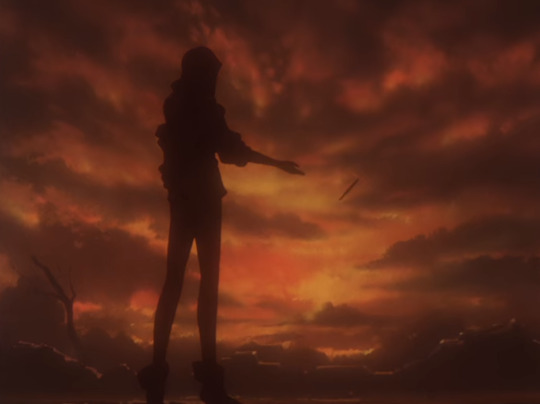
And I think a big part of that is how disarming its episodic charms are. I think a lot of people would still love this show if it was just the crew chasing a different bounty episode after episode. The way they wield their action and wit so masterfully, and then fatefully condemn characters to very relatable pains of living has again left me feeling awash among myself.
Spike's underlying story is fragmented, even at the end. That quality gives reason to Faye's rare outburst in episode 26, because it is really our outburst. Similarly, it's amazing how meaningful Julia, Annie, Shin, and Lin were despite how little time they spent on screen, and how little their stories were shown.
The way this show captured loneliness and the passage of time made me truly uncomfortable. Let it be known that some of the most emotion-provoking characters are a bunch of space-searing, gunslinging bounty hunters from a show that came out before the millennium turned.
The music is suitably varied, changing for the scenes, planets, and feelings the crew travels through. Sure, to me, no tracks stand out, but to me, I still feel like they were incredibly well-fitting.
As for me, things have been rough for a few months, but I'm slowly going through positive changes. I think I'm understanding my place to come home to as well. I hope you're doing okay.
- For Ice Cream
1 note
·
View note
Text
A Paragraph: Spice & Wolf's Yume no Manimani
Yume no Manimani starts off with a free reed instrument melody, accompanied by a violin descant, a violin's pizzicato, and a cellist's bassline pizzicato. The melody is yearning, but doesn't find where it is to be uncomfortable. After completing the melody, more arco strings come in with sustained chords and fresh descant lines, almost completely covering the free reed instrument. Usually that's not a good thing in chamber music, but here, the thickness of the arco strings and their countermelodies come with a sincere swell of emotion. They rise in intensity with the harmony and fall off through repeated chords and the pizzicato line that sustained the pulse throughout, leaving me with a feeling that if I wanted to, I could remember being in love in the Fall.
Let me know if you know what that free reed instrument is!
Happy Fall holiday.
- For Ice Cream
1 note
·
View note
Text
Short Thoughts: Barakamon
To get right to it - I've been dealing with a lot of doubt about the future. I've always prided myself on being ceaselessly productive, even in hobbies (this tumblr?), so taking a break these last few weeks has been really difficult to do. I feel guilty for not surging forward like my friends, restless when opportunities are announced, and worried that I'm wasting time. But I've been feeling better, consistently. And today, that feeling reminded me of Barakamon and now, I find myself here, smiling, at 1 am.
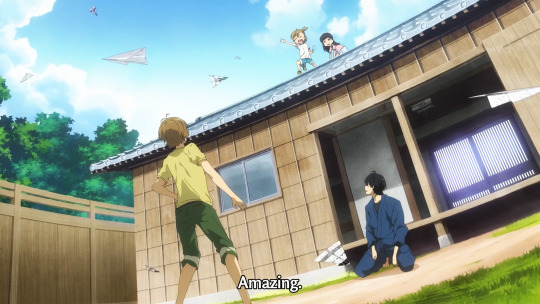
Perhaps most importantly, watching the show really feels like the environment it wants to show: a breath of fresh air. The earnestly funny characters, some of my favorite writing and acting for children and the elderly in anime, and the light, yet honest way they deal with negative feelings are just a few things that keep this show on my top twenty list.
Their comedy is pretty fantastic, especially given how PG the show is (aside from one stupid, useless echinoderm scene). Laughing out loud at TV is rare for me, but there were some simple, yet perfectly executed scenes with Naru that were just perfect, like this legendary intro from Episode 3.
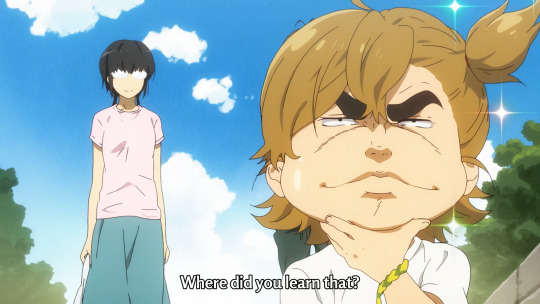
This lighter show carries a lot: self-doubt, inspiration, guilt in relaxing, the meaning of growing up for different ages, celebrating loved ones who have passed, competition, risk-taking, letting go, knowing that times are fleeting, community. One of my favorite takeaways was that being competitive, growing, and doing your best are not always well-achieved by keeping your gaze vigilantly locked at the top. And that's a common piece of advice, but Barakamon knows how to make it touching and not judgmental. An example of that - Hiroshi's self-esteem and thoughts about the future are unusually emotive, despite seemingly functioning as just a classic side character.
They choose and set their warmer emotions wonderfully. Nothing feels stretched out of proportion or unworthy. I also love their scores and how they are used and placed in the show. "Flow of Time" and "Empathy and Impression" are especially beautiful. For the show to have all of this, and then to watch it again now being around Seishuu's age is...something.
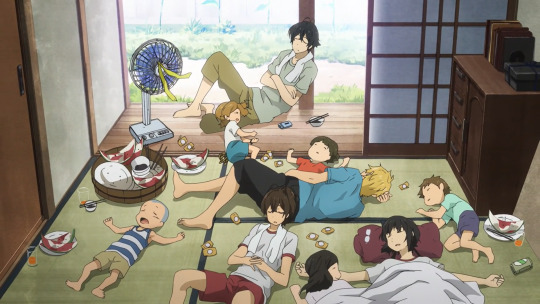
For me, it's hard to feel affirmed without feeling like I'm being overly indulged. Yet, that's exactly how I felt while watching the show, and how I feel right now after finishing it again. No tightness in the back of my neck, or that strained feeling behind my eyes.
I have an audition soon, and I'm finally looking forward to it.
And I hope you're doing better. Best of a break this weekend and best of luck with this next week.
- For Ice Cream
1 note
·
View note
Text
Short Thoughts: SSSS.Gridman
SSSS.Gridman is definitely a show that I wrote off back when it came out. Mecha anime usually like a few too many things that don't grab me. But while SSSS.Gridman chose a mostly similar path, I thought it walked that path at a very unique speed and with a very unique balance: a few forgettable robot-alien fights, a lot of coming-of-age angst, and a willingness to linger in scenes that they wanted to be important.
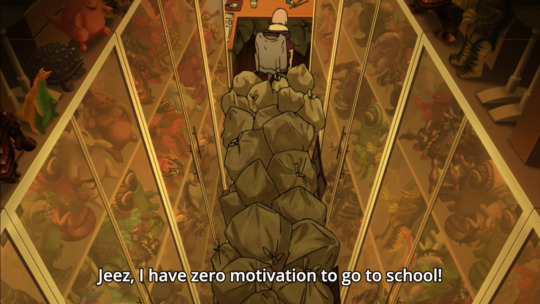
Even if there were episodic, "levelling up" mecha fights, it's clear that they were not the spotlight, and that they had another function entirely. If I watched only the fight scenes one after the other, I would say things like "bad tropes" and "lack of creativity." For those who are familiar with the original material, these fight scenes would be obviously intentional for a different reason, but even for a viewer like myself, those repetitions clearly foiled the content the show actually spent time on--meta conversation. Then, taking all of that into context with the reality of the world as it's slowly revealed, all of those conversations that worked well as anime dialogue in previous episodes take a different weight and feel legitimately artistic.
I noticed the pacing right away. I absolutely adored choices of stillness and silence, that when a character was thinking, it wasn't always enunciated by a thinking noise or a pose. It reminded me a lot of older shows I liked, Shakugan no Shana, Digimon. Then they did the mecha things, where they have to shout out activation sequences, where they have to show mecha assembly, but many other mecha-focused scenes felt rushed, on purpose. During moments when other shows would explicate the logic and magic of their world's science to convince you of its soundness, this show for the most part strolled on past, letting you join them in the middle of their journey, then at the end, leaving you in the middle of yours.
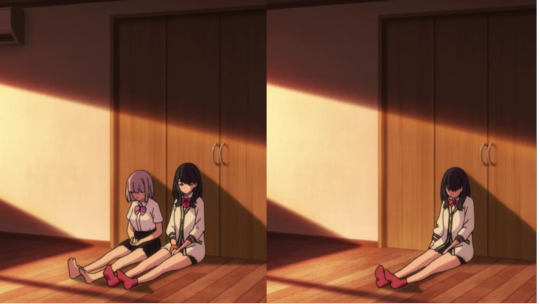
Rikka is the main character. I don't think anyone will argue against that. The show warmed that way pretty quickly, but her reaction to victory at the end of the first episode convinced me. I absolutely love how they portrayed her emotions, her tired, her frustrated, her "just-effing over it." And then all of her personality and actions, and the seemingly illogical centering of Hibiki fit so well with the storyteller and how they feel about themselves, and how events unfold in the second half of the show. And her character and journey is still rewarding even if you watch EDs haha.
I loved that ending. I actually liked the show, but it's a very rare show that I think would be worth watching just to experience such an iconic moment. And actually, in my own distorted moment of transition, it was a earnest comfort.
I loved Union by OxT! That's been on repeat since last night.
Until next time,
For Ice Cream
#mecha anime#ssss gridman#anime#high school anime#rikka takarada#anime review#OxT#gridman#takarada rikka#shinjo akane#akane shinjou#ssss.gridman
3 notes
·
View notes
Text
Short Thoughts: The Witcher - Nightmare of the Wolf
Even from the start of The Witcher 3: The Wild Hunt, I was completely glued to the screen. Graphics that were stunning on a lower end gaming laptop, fantastic movement and ambiance sounds, a combat system with many options. But 150 hours later, when I was finishing the last Grandmaster armor set and watching Geralt settle down with Yennefer in Toussaint, it was the deep emotional toning, the almost-futile fighting against dark systems in a heavy world, the music that seemed to sink and wash my mind every time a track played...it was all these things that left me hit hard long after I finished the game.
Last night, I watched Nightmare of the Wolf, and I thought they did a wonderful job in these elements, in just an hour and a half.
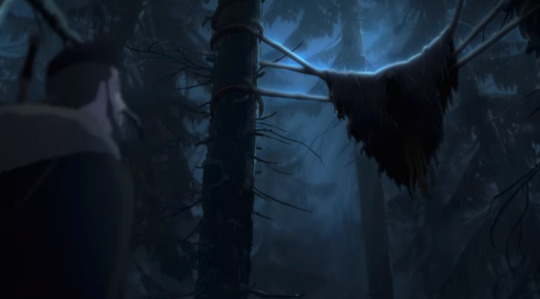
To me, the Witcher series continues to be so attractive compared to other medieval fantasies because of how it portrays an epic, worthwhile hopelessness, illuminated every so often by humble moments of human happiness. In this movie, a viewer quickly receives large doses of corruption and selfishness, in the government, in the guild of the witchers, in the actions between the mages of the show. Then, some time afterwards, the characters displaying those toxic actions are given earnest humanity, through conversation or sharing of a tragic backstory.
At times in this film, there was a little much monster violence for monster violence's sake, but for the most part, I was made to feel appropriately horrified and uncomfortable at the violence and its normalization in this crafted universe. Watching monsters kill people in this movie with quickness was a different Witcher experience for me. In the game, the player can just spam dodge or Quen and run in circles while chipping away, but here, you're forced to watch futile escape attempts and indefatigable monstrous onslaughts.
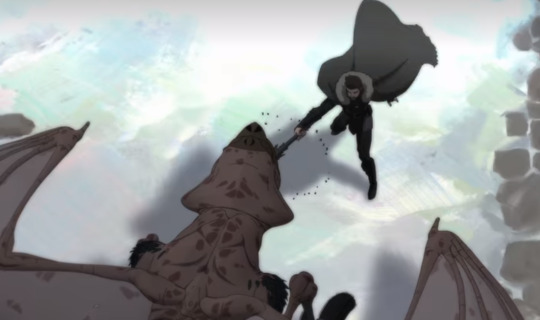
Just like in the game, characters' actions have consequences, but sometimes they don't, or maybe they don't have the consequences that seemed guaranteed and you feel betrayed or jaded. Watching some characters take intervening action knowing the consequences, while others stave off inspiration to solidify their position or status seemed to give a message of, "you can take action" and nothing more than that. Especially with regards to these emotional and reality-driven dilemmas, I thought the writing came together beautifully with the music, art, and animation to deliver a truly rich experience.
I'm really looking forward to more Witcher content, be it another game, translation, movie, or TV show. I'm still thinking about how Vesemir is portrayed in the The Wild Hunt, against the backdrop of the story told through this film.
I hope you are well, and that the world is treating you well.
Until next time,
For Ice Cream
#the witcher#vesemir#nightmare of the wolf#witcher 3#the wild hunt#the witcher nightmare of the wolf#animated film#netflix
10 notes
·
View notes
Text
Short Thoughts: Children of the Sea
If you're feeling a little lost, I highly recommend Children of the Sea. Magical realism and verklempt animated art tell a wonderfully nuanced story, one that can be deeply appreciated regardless of how simple or how complicated a viewer's interpretation might be.
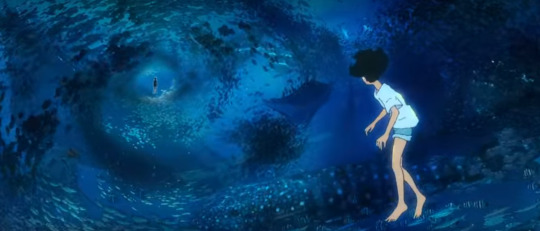
Even before the magic kicked in, the art struck me immediately: the level of detail in the roof tiling, the dirt, all the natural imperfections. Also, Studio 4°C portrayed Ruka as a teen wonderfully well, in how she exudes emotions without addressing them, and how she reacts viscerally to conflict, pride, embarrassment, and exclusion. Then, as the story became more magical, the art became more magical as well, especially with how the artists and animators drew outer space and the ocean. This film had the best animated water I have ever seen; sometimes they went for uber-realistic, sometimes super fantastical, other times metaphorical. Their water was amazing!
And you might expect that dedication to water in a movie with this title, but there were also many beautiful touches that I did not expect. I really loved the way they had the camera move and accelerate with Ruka in some moving scenes, instead of rotating or remaining stationary. I loved how they animated first-person vision going between air and water in a choppy surf. They captured the third dimension in two dimensions in such a convincing, artistic fashion, and made their scenes feel so wonderfully full.
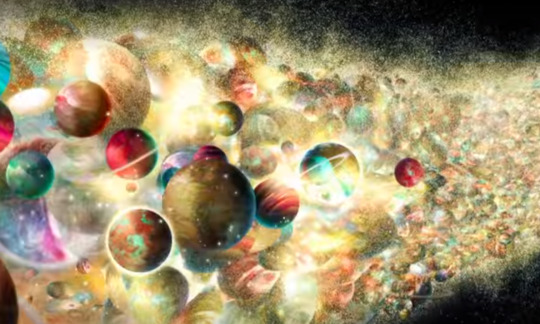
This is another film where the writers resolve just about everything, from majestic tensions caused by the cataclysmic convening of all the world's oceanic creatures, to a couple of B-roll cuts of moths around a lit then not lit lantern, to unnarrated familial tensions, and to the very first scene that perturbs Ruka.
The small moments of tragedy and fear are both well-placed and well-paced. And with all the exquisitely understated drama, there's some really nice understated comedy too. I love how the story about Umi and Sora is the main story, yet not, and how Ruka, Ruka's family, and her school environment are the main story, yet not. And some of the most engaging conversations were between side characters, and those moments still felt so natural.
Fantastic, interesting musical compositions. Even in the most visually romantic, emotionally sweeping scenes, they rarely chose overflowing music, which I think really worked with Ruka's personality and how she struggled with fitting in, opening up, and self-reflection. Studio 4°C opted for quaint, mysterious, and expansive, and they grew those adjectives and their weight by repeating musical themes. They also did some muffling of the music during some underwater scenes...just...chef's kiss and all that.
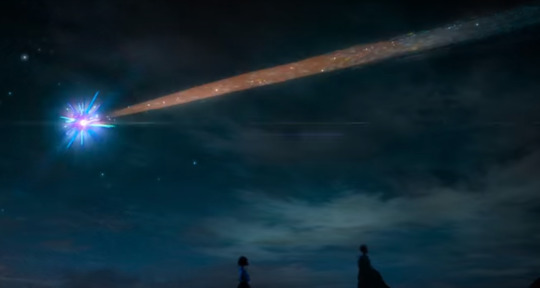
It's so relatable how caught up Ruka gets in such a spiraling adventure that sends her into the universe and the deep sea without leaving home and the problems close at hand. That she's taken with the concept that whales can transmit their experiences fully, without words. The artists literally drew streaking galaxies and countless helices of swirling marine life, and they laid layers of visual and spoken metaphors that I will spend hours thinking about, but also through all that, they resolved what seems like a common insecurity.
I adore the ending where Ruka opens up and made me feel a little more at peace with the confusion, vastness, and vacillating fullness and emptiness of the present moment.
Until next time.
-For Ice Cream
#anime film#anime movie#anime#studio 4°c#Ruka#ayumu watanabe#eiko tanaka#daisuke igarashi#joe hisaishi#magical realism#animated film#film
44 notes
·
View notes
Text
Short Thoughts: Trese
I'm a fan of manipulating perspective and dark fantasies, but for me it was the constantly oppressive, gritty atmosphere and even just the skimming of the surface of Filipino mythology that made Trese a six-episode series that I watched straight through.
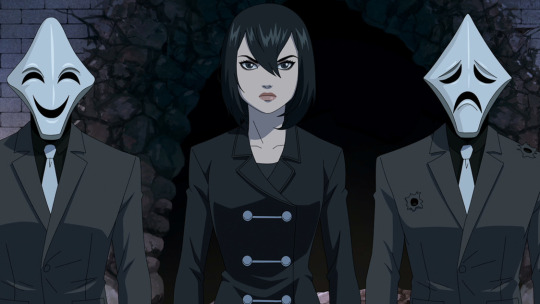
While the first episode made me think Trese would follow the "magical folks assist the police" structure with all of its predictable elements, Trese raised the idea of an underlying connection very quickly. Because of that, I was unconsciously more numb or trusting of certain characters and certain ideas, which made the end of this first season even more disorienting to watch, somehow in a good way. What they did with the perspectives and identities of some of the characters felt perfectly connected and resolved.
Usually a main character has to collapse in exhaustion to show an audience the weight of a stressful environment, but Alexandra's personality is cool, but more gripped than calm, and that concept combined with the flashbacks to her childhood gave a real dissonant weight to the show that I can still feel now.
Were there villainous motives that didn't seem sufficient for their actions or worth the outcomes? To my taste, yes. Was the animation a little clunky at times, and a little light during fight scenes? Sure. Was there a little more explanation needed even by the sixth episode, and somehow a little less explanation desired? I would say so. But I think the show was still very much worth watching despite some simple shortcomings.
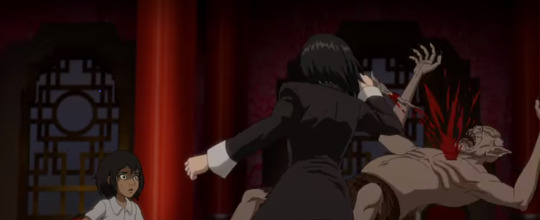
On the whole, I wish more was done with intertwining the mythology with the contemporary setting. I liked that a few groups of mythological beings had integrated themselves into certain parts of life in this fictional version of Manila. I liked the small touches, like that the two "wind people," Ammy and Hannah, is likely a reference to Amihan, both a mythological bird and a windy season (according to Wikipedia).
Finding out later that the English voice actress for Alexandra was Shay Mitchell, who I still remember as being really engaging in "You" was a cool surprise. Will definitely give it another go with the Tagalog voice acting sometime because I heard that was great.
And now, back to studying.
- For Ice Cream
#trese#alexandra trese#anime#dark anime#shay mitchell#light horror#dark fantasy#budjette tan#kajo baldisimo
8 notes
·
View notes